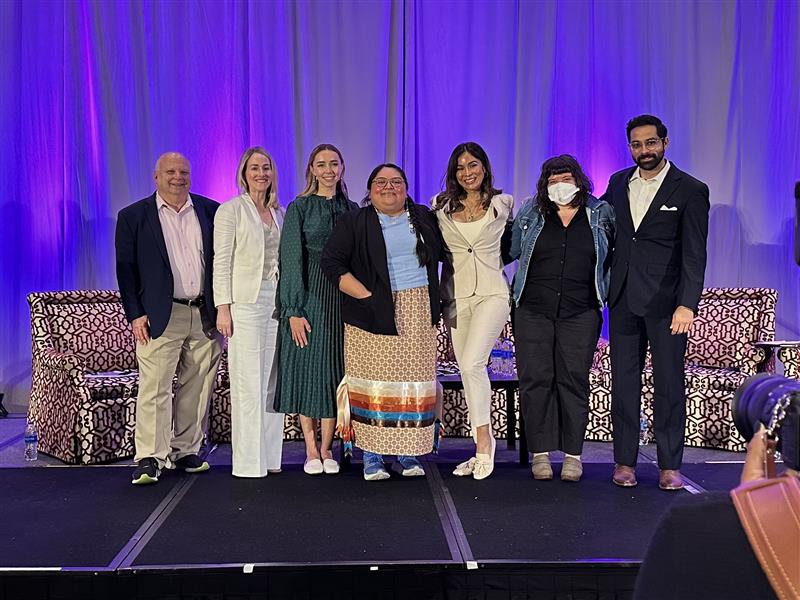Navigating Tomorrow: Leveraging Public Health Institutes to Address Climate and Crisis Preparedness
- By: National Network of Public Health Institutes
- Date
The NNPHI Annual Conference has made remarkable strides in integrating climate content, evolving from individual sessions in the past to a prominent plenary panel on the main stage.
This past May, NNPHI’s Public Health AmeriCorps Program and Environmental Health and Climate Workgroup presented at the NNPHI Annual Conference in New Orleans. Titled “Navigating Tomorrow: Leveraging Public Health Institutes to Address Climate and Crisis Preparedness,” the panel featured four public health institutes lead by Madelyn Gustafson and Francesca Toledo-Alexander of the Climate and Crisis Preparedness portfolio at NNPHI. Among them were Health Resources in Action (HRiA), Colorado Health Institute (CHI), Texas Health Institute (THI) and Puerto Rico Public Health Trust (PRPHT) . The panelists all engaged in the Environmental Health and Climate Workgroup or Public Health AmeriCorps Program, each panelist brought a wealth of expertise and experience to the table. The panelists showcased four incredible strengths: policy advocacy, community engagement, innovative solutions, and impactful communications, providing a comprehensive approach to tackling climate-related health challenges.
Geri Medina, from Health Resources in Action (HRiA), spoke on the value of partnerships and the importance of centering around the community in public health. She emphasized the significance of providing support in grant writing, which enables community-based organizations to secure necessary funding for their initiatives. Additionally, she highlighted the hosting of a NNPHI Public Health AmeriCorps member at one of their community-based organizations, Everett Community Growers. Medina shared the impactful work being done by Shannon Collins, who is leading efforts to improve the access and education of the Everett community. Through initiatives such as urban farming, nutrition education, and community engagement, Collins is fostering a healthier, more resilient community. Medina underscored that these partnerships and community-focused strategies are vital for creating sustainable public health improvements.
Karam Ahmad, Director of Colorado Health Institute (CHI), discussed how the robust Acclimate Colorado Program shifted from a project to a priority. The now seven-year program has a strong policy arm, working directly with governmental partnerships and providing advocacy recommendations. Ahmad highlighted that the program’s evolution has been driven by the increasing urgency of addressing climate-related health issues. Acclimate Colorado now plays a pivotal role in shaping state policies to mitigate climate impacts, engaging with various local communities and organizations, and policymakers, to develop comprehensive strategies that protect public health in the face of climate change.
Leslie Ortiz Montes, Communications Manager at the Puerto Rico Public Health Trust (PRPHT), discussed the importance of storytelling. How we communicate about climate is extremely important, from notifying the public on how to prepare for climate impacts to making impactful change on the environment. Leslie also shared the incredible work that the five active Public Health AmeriCorps members are doing at the Trust. Each focused in different areas from graphic design to epidemiology to community engagement, their work has been beyond valuable to the Trust.
John Oeffinger, from Texas Health Institute (THI), spoke on how we can still prioritize climate in the midst of many public health workforce changes, including advancements in technology, the impacts of COVID-19, and evolving work environments. He emphasized that despite these challenges, integrating climate considerations into public health strategies is crucial. Oeffinger highlighted the importance of leveraging new technologies to monitor and mitigate climate impacts and adapting to new work models to maintain effective collaboration, including the NNPHI Public Health AmeriCorps Program. By focusing on innovative solutions and resilient practices, the public health workforce can effectively respond to climate-related health issues while navigating ongoing changes.
The panel highlighted the collaborative spirit and shared commitment among public health professionals to address the pressing issues of climate change. Through the combined efforts of these public health institutes and the support of initiatives like the NNPHI Public Health AmeriCorps Program and the Environmental Health and Climate Workgroup, the path forward is motivating. The insights and strategies shared at the conference will undoubtedly inspire continued innovation in public health efforts nationwide.
Find out more about #NNPHIAC24 by visiting here.




 Subscribe To Our Communications
Subscribe To Our Communications